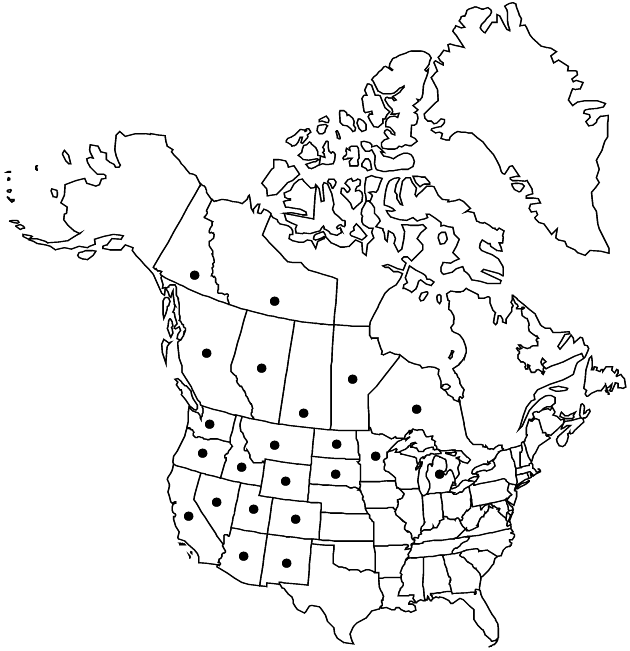Difference between revisions of "Agoseris glauca"
Herb. Raf., 39. 1833.
FNA>Volume Importer |
imported>Volume Importer |
||
| Line 8: | Line 8: | ||
}} | }} | ||
|common_names=Prairie agoseris | |common_names=Prairie agoseris | ||
| + | |special_status={{Treatment/ID/Special_status | ||
| + | |code=F | ||
| + | |label=Illustrated | ||
| + | }}{{Treatment/ID/Special_status | ||
| + | |code=E | ||
| + | |label=Endemic | ||
| + | }} | ||
|basionyms={{Treatment/ID/Basionym | |basionyms={{Treatment/ID/Basionym | ||
|name=Troximon glaucum | |name=Troximon glaucum | ||
| Line 26: | Line 33: | ||
-->{{Treatment/Body | -->{{Treatment/Body | ||
| − | |distribution= | + | |distribution=Alta.;B.C.;Man.;N.W.T.;Ont.;Sask.;Yukon;Ariz.;Calif.;Colo.;Idaho;Mich.;Minn.;Mont.;N.Dak.;N.Mex.;Nev.;Oreg.;S.Dak.;Utah;Wash.;Wyo. |
|discussion=<p>Varieties 2 (2 in the flora).</p> | |discussion=<p>Varieties 2 (2 in the flora).</p> | ||
|tables= | |tables= | ||
| Line 56: | Line 63: | ||
|basionyms=Troximon glaucum | |basionyms=Troximon glaucum | ||
|family=Asteraceae | |family=Asteraceae | ||
| − | |distribution= | + | |distribution=Alta.;B.C.;Man.;N.W.T.;Ont.;Sask.;Yukon;Ariz.;Calif.;Colo.;Idaho;Mich.;Minn.;Mont.;N.Dak.;N.Mex.;Nev.;Oreg.;S.Dak.;Utah;Wash.;Wyo. |
|reference=None | |reference=None | ||
|publication title=Herb. Raf., | |publication title=Herb. Raf., | ||
|publication year=1833 | |publication year=1833 | ||
| − | |special status= | + | |special status=Illustrated;Endemic |
| − | |source xml=https:// | + | |source xml=https://bibilujan@bitbucket.org/aafc-mbb/fna-data-curation.git/src/bb6b7e3a7de7d3b7888a1ad48c7fd8f5c722d8d6/coarse_grained_fna_xml/V19-20-21/V19_494.xml |
|tribe=Asteraceae tribe Cichorieae | |tribe=Asteraceae tribe Cichorieae | ||
|genus=Agoseris | |genus=Agoseris | ||
Revision as of 20:38, 27 May 2020
Stems 0. Leaves erect to decumbent; petioles rarely purplish, petiole margins glabrous or pubescent, not usually ciliate; blades lanceolate to oblanceolate, 2–46 cm, margins usually entire, sometimes dentate, rarely lobed or lacerate, lobes 2–3 pairs or irregularly arranged, lanceolate, spreading, lobules 0, faces glabrous and glaucous or sparsely villous to tomentose. Peduncles not notably elongating after flowering, 5–60(–90) cm in fruit, glabrous or glabrate, or apically puberulent to lanate, sometimes stipitate-glandular. Involucres obconic to hemispheric, 1–3 cm in fruit. Phyllaries in 2–3 series, green or medially rosy purple, often with purple-black spots, midstripe, and/or tips, subequal to unequal, margins glabrous or ± hairy, not usually ciliate, faces glabrous or tomentose, sometimes stipitate-glandular or eglandular; outer erect or spreading, apices adaxially glabrous or hirsuto-villous; inner erect, not notably elongating in fruit. Receptacles epaleate or paleate. Florets 15–150; corollas yellow, tubes 4–18 mm, ligules 6–24 × 2–5 mm; anthers 3–7 mm. Cypselae 7–15 mm, bodies fusiform to narrowly conic, 5–9 mm, tapered to stout beaks 1–4 mm, lengths mostly less than 1/2 times bodies; ribs flattened to ridged, glabrous, or distally scabrous; pappi in 2–3 series, 8–18 mm. 2n = 18, 36
Distribution

Alta., B.C., Man., N.W.T., Ont., Sask., Yukon, Ariz., Calif., Colo., Idaho, Mich., Minn., Mont., N.Dak., N.Mex., Nev., Oreg., S.Dak., Utah, Wash., Wyo.
Discussion
Varieties 2 (2 in the flora).
Selected References
None.
Key
| 1 | Receptacles epaleate; leaf blades usually glabrous and glaucous, rarely sparsely hairy; peduncles (distally, and phyllaries) usually glabrous, some- times puberulent, eglandular | Agoseris glauca var. glauca |
| 1 | Receptacles usually ± paleate; leaf blades usually puberulent to densely villous, sometimes glabrous; peduncles (distally, and phyllaries) usually villous to lanate or tomentose, sometimes glabrous, often stipitate-glandular | Agoseris glauca var. dasycephala |